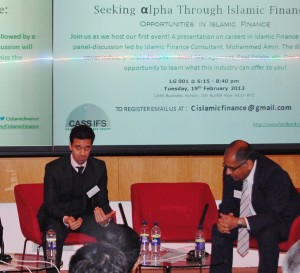Alternative Issue: Islamic Finance Investments on the Rise, but are there any Jobs?

Left to right: Harris Irfan - Director at European Islamic Investment Bank and Mohammed Amin writer and speaker on Islamic finance.
Investments in Islamic finance are increasing at a rapid rate globally. According to Ernst and Young global Islamic banking assets held by commercial banks are set to reach almost two trillion this year, up from the US$1.3 trillion of assets held in 2011. The sector has seen a 150% increase in the past five years.
There are over 300 Shariah compliant financial institutions worldwide. UK Islamic Finance Secretariat (UKIFS) said Islamic markets have developed in Malaysia, Iran and the Gulf and have potential in developing in Australia, Nigeria and Russia.
A Shariah based banking system does not allow interest-based investments nor does it allow investments based on unethical ventures. These unethical ventures include businesses that provide alcohol, tobacco, pork, gambling, adult entertainment and conventional finance.
A new society seeking to increase awareness of Islamic Finance held it’s first event in February at Cass Business School of City University. The event explored career opportunities available for young people within Islamic Finance. Speakers included specialists and those working within the sector: Mohammed Amin and Harris Irfan.
Bana Sharif Al-Haramain is the president of the new society. Haramain decided to set up the Islamic finance society to promote the system. He said “The growth in the Islamic Finance field is phenomenal. I thought there is no place people could have dialogue for Islamic finance”. The business school does offer it’s master’s students the study of Islamic Finance as an elective module so there naturally lies potential and demand for the new society.
What does Islamic finance have to offer? The main difference between Islamic investment banking and the workings of corporate banking currently is the system is dependent on stability rather than risk.
Imad Ilyas, a master’s student of finance at Cass Business School said: “The most important of principles is that Islamic Banking prohibits speculative behavior which is quite prevalent in the futures and options markets. The idea behind this is to prevent situations of excessive volatility and greed which have led to financial meltdowns that we have seen in the past”.
Although interest cannot be earned through placing money in an Islamic account, withdrawals can be made on demand as it has a 100% reserve ratio. Interest-free loans can be taken out for productive purposes. Islamic banks take a more optimistic approach; whether or not the bank lends money is determined by the potential of productivity rather than the borrowers past credit ratings. If a person takes out a loan because they need to, it is deemed unethical to charge them interest on return.
The Islamic system also allows for wider distribution aiming to maximise social welfare (Maslahah). The sharing of profits and losses between the lender and borrower of money is based upon an Islamic concept called “Mudharabah”. This sharing of profits and losses differ from conventional banks that place all pressure on the borrower of money. A system based on Shariah ethics seeks to distribute wealth to poorer communities.
This concept of giving to those facing financial difficulties is called “Zakat”. In the Western world, this is known as charity. The holy book of Islam, the Quran, states Zakat is “a levy imposed upon the well-to-do which is returned to the poorer sections of people”.
Zakat is one of the five pillars of Islam which requires Muslims to donate a certain proportion of their income. This proportion is dependent upon the wealth of each individual’s assets. Islamic banks calculate for this therefore creating a prime customer base by offering this service. However Islamic banking is not exclusive to Muslims; anyone is entitled to set up an account within an Islamic bank.
Mohammed Amin speaker on Islamic finance estimates that there are 1,000 jobs dependent on Islamic finance in the UK but for students he says “there are no graduate training schemes available”. The main reasons for this are the banks are still small and cannot cater to train those coming out of university. If finance students have appropriate language skills they can strive to join the developed markets in places such as Malaysia so long as they are prepared to compete with locals.
Careers in Islamic finance may be the only banking sector option for Muslims who do not wish to work amongst commercial banks as they regard some of it’s practices unethical. Aisha Durvesh is studying for her master’s degree in International Accounting & Finance at Cass Business School. Durvesh said: “my religious preferences don’t allow me to work in conventional banks. All non-banking finance fields such as Audit, Tax, Corporate Finance are still open to me, so Islamic Finance is the option within the Banking sector”.
Harris Irfan from European Islamic Investment Bank (EIIB) says the Islamic institutions are behind commercial banks due to their lack of resources, specialists and Shariah compliant banks. Irfan advises young bankers: “Don’t be too idealistic about the Islamic finance industry.” He added that the industry has missed a trick by focussing on the notion that it is Islamic rather than emphasising the potential it’s model has in the economic world.
Whilst figures of growth may seem promising, Ernst and Young’s report also highlights that profitability of Islamic banking continues to fall behind conventional banking in the same markets. There are five standalone Islamic banks in the UK all of which have made losses.
Selling an Islamic system in the UK is difficult. Islam within the UK is often associated with controversy. It stages on the news agenda with repetitive stories on home-grown terrorism, social issues, and militancy overseas.
Negative representation and stereotypes of Islam inevitably causes people to be reluctant in investing money within an Islamic system despite it’s benefits. Better PR is required to encourage investment however as Irfan points out, without funds, it cannot compete with commercial banks ability to sell its image.
According to Ernst & Young’s report, improvements will be made over the next two to three years, with the aim to close the performance gap that currently exists with the overall banking industry. If the modifications work, the profit pool of Islamic banks has potential to rise an additional 25% by 2015.























